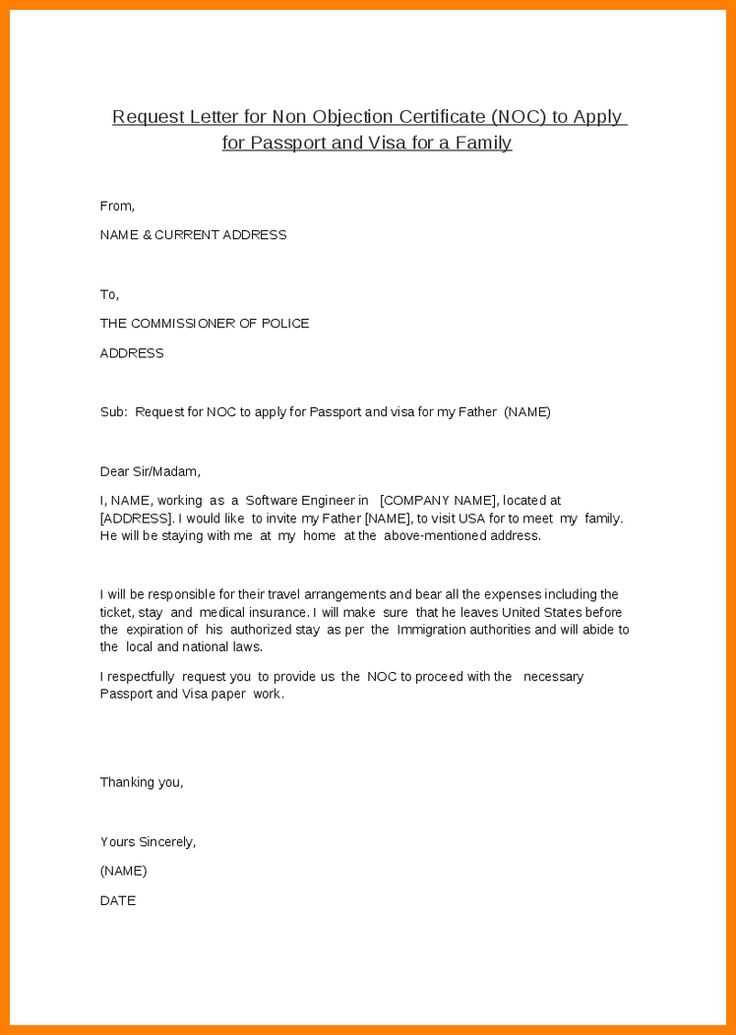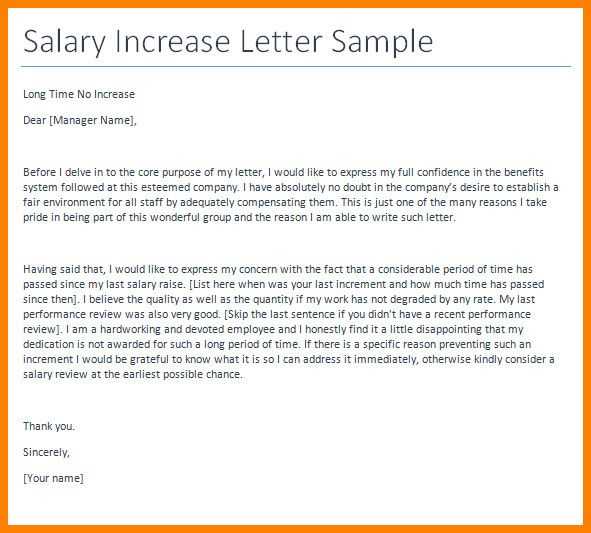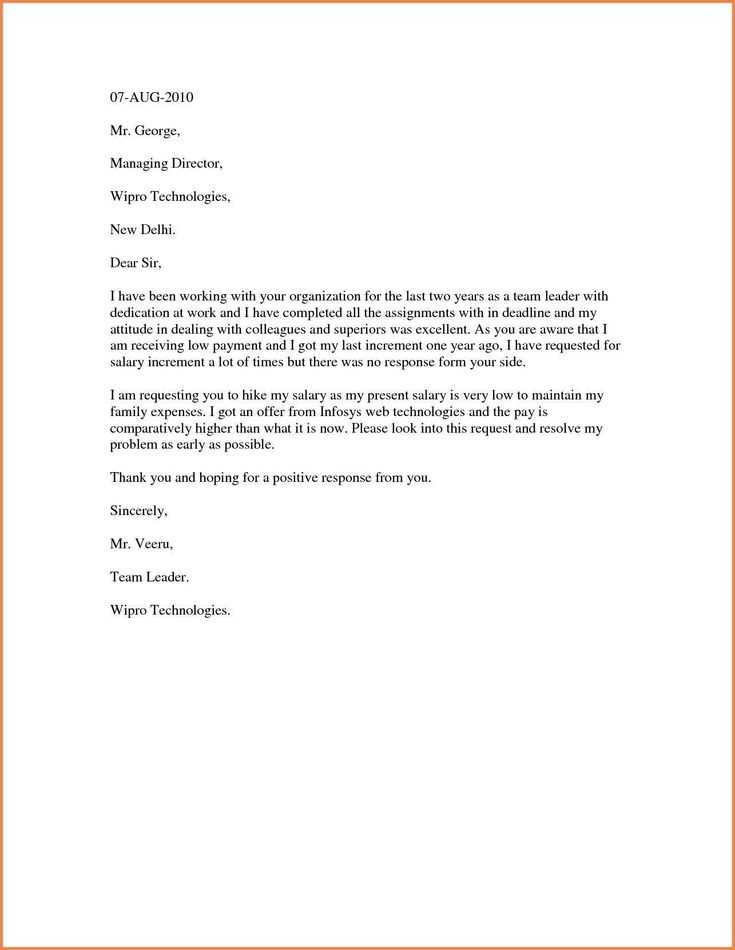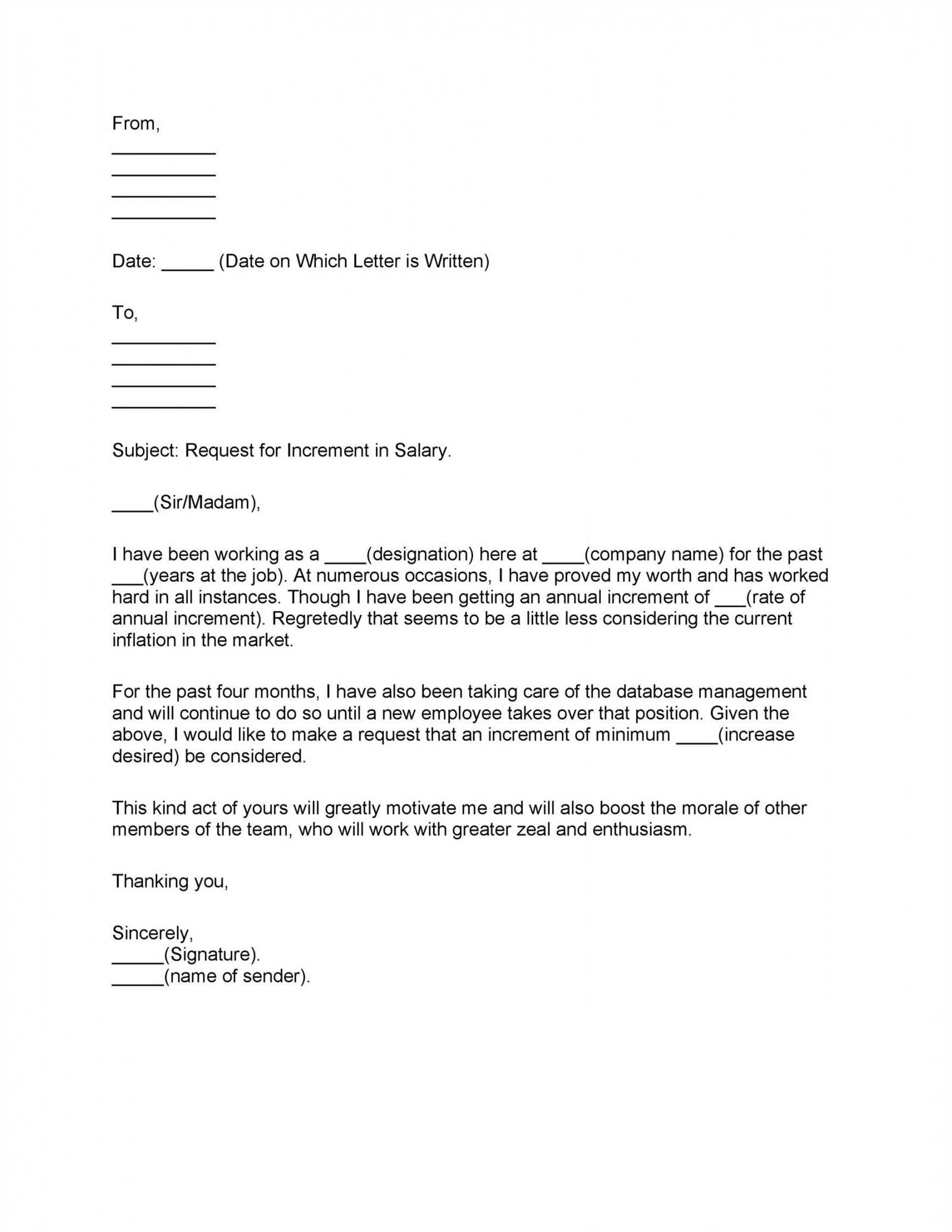How to Write a Salary Increase Request Letter Template

As professionals grow in their roles and contribute more to their organizations, it becomes important to formalize the process of discussing compensation changes. Making such requests can be a sensitive matter, but approaching it thoughtfully and strategically can significantly improve the outcome. Clear and respectful communication is key when seeking a review of your current remuneration package.
Crafting a well-structured request is crucial in ensuring that your points are heard and considered. Understanding what to include and how to phrase your appeal will help you create a compelling case. A well-written request can demonstrate your professionalism, showcase your accomplishments, and set the stage for a productive conversation.
Why You Need a Pay Adjustment Request
When you feel that your compensation no longer aligns with your role or responsibilities, formally addressing this with your employer is essential. A structured approach ensures that your request is taken seriously, and it gives you a chance to present your case effectively. Having a clear, well-prepared document shows your professionalism and sets the tone for a constructive discussion about your remuneration.
Demonstrates Professionalism
Approaching the matter through a written format not only makes the conversation more formal but also shows that you value the process. It reflects your ability to communicate effectively, which is a critical skill in any professional environment. By presenting a clear request, you communicate your intentions and make it easier for your employer to consider your perspective seriously.
Provides a Clear Record
Having a written request offers a tangible record of your conversation, which can be referenced later. This helps avoid any misunderstandings and ensures that both parties are clear on the expectations moving forward. A well-documented request also serves as a reminder of your value to the company, particularly if you are negotiating based on past performance or new responsibilities.
Understanding the Right Time for a Pay Adjustment Request

Knowing when to approach your employer about adjusting your compensation is crucial for ensuring a positive outcome. Timing plays a significant role in how your request will be received, and understanding the right moment can increase your chances of success. A well-timed request is often based on performance, market conditions, and the overall health of the company.
Key Factors to Consider
Before making a request, it’s important to evaluate several factors that might influence your chances. These include your recent accomplishments, company performance, and any changes in your responsibilities. Timing your request when these factors align with your value to the company is ideal.
| Factor | Why It Matters |
|---|---|
| Job Performance | Strong performance provides a clear justification for your request. |
| Company Financial Health | If the company is thriving, they may be more open to rewarding employees. |
| Market Trends | If the industry standards have shifted, you may have a stronger case. |
Choosing the Right Moment
Timing your conversation around key milestones, such as after successfully completing a major project or during annual reviews, can increase the likelihood of a favorable response. Avoid raising the issue during times of organizational uncertainty or when the company is experiencing financial difficulties.
Key Elements to Include in the Request

When preparing a formal appeal for a compensation review, it’s essential to include specific details that will strengthen your case. A well-structured request should outline your contributions, your justification for the adjustment, and how your role has evolved over time. Including the right elements ensures clarity and helps your employer understand the basis of your request.
Essential Components to Mention
- Introduction: Clearly state the purpose of your request and provide a brief context.
- Your Achievements: Highlight your contributions and successes that demonstrate your value to the organization.
- Job Responsibilities: Detail how your role has expanded or evolved since your last review.
- Market Comparison: Mention how industry standards align with your current position.
- Proposed Adjustments: Specify the desired change in compensation.
- Conclusion: Close with a polite and professional note expressing your willingness to discuss further.
Additional Considerations

- Ensure your tone is professional and respectful throughout the request.
- Avoid making comparisons with colleagues, focusing on your personal achievements.
- Be concise but detailed enough to provide a clear case for your request.
How to Address Your Pay Adjustment Request Professionally
When requesting a change in your compensation, it’s important to communicate in a professional manner that reflects your value to the company. Addressing the matter thoughtfully and respectfully increases the likelihood of a positive response. The way you approach the conversation plays a key role in how your request is perceived, so careful wording and a respectful tone are essential.
Start by addressing the right person in your organization, usually your immediate supervisor or HR representative. Ensure that your message is clear, concise, and free of unnecessary emotions or demands. A well-structured and formal request should focus on the facts and demonstrate how your contributions justify the request.
Common Mistakes to Avoid in Compensation Requests
When making a formal request for a compensation review, there are several common mistakes that can weaken your case or negatively impact the way your message is received. It’s crucial to approach the matter with care, avoiding pitfalls that could undermine your professionalism or diminish the effectiveness of your request.
Emotional or Demanding Tone
One of the most common errors is letting emotions drive the tone of your request. Even if you’re frustrated or feel undervalued, it’s important to remain calm and professional in your wording. A demand or overly emotional message can harm the perception of your request and may reduce the chances of a positive outcome.
Unclear Justification for the Request
Another mistake is failing to clearly explain why you’re seeking a compensation adjustment. Simply stating a desire for more money without providing context or evidence of your contributions won’t be convincing. It’s important to highlight your accomplishments, the evolution of your responsibilities, and how your performance aligns with your request.
Tips for Negotiating After Sending Your Request
Once you’ve submitted your formal request for a compensation review, the next step is to be prepared for a negotiation. The way you approach the follow-up conversation can significantly impact the outcome. It’s important to remain flexible, confident, and open to discussion, while also ensuring that you effectively communicate your value and expectations.
Be Prepared to Explain Your Request
During the negotiation, be ready to reiterate the reasons behind your request. Focus on your contributions, achievements, and the impact you’ve made on the company. Highlight how your role has evolved and why the adjustment is justified based on industry standards or the company’s success.
Stay Professional and Open to Compromise
Approach the conversation with a collaborative mindset. Listen to your employer’s perspective, and remain open to alternatives or compromises, such as non-monetary benefits if the financial adjustment is not immediately feasible. Negotiating effectively requires patience and a willingness to find mutually beneficial solutions.